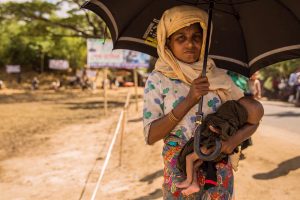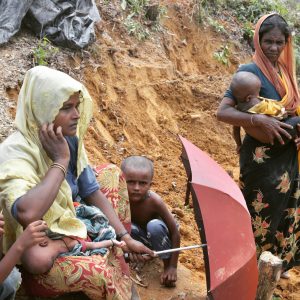 Two years after over 700,000 people fled Rakhine State in Myanmar, they remain stranded, living in in cramped tents and temporary plastic shelters, in conditions that fall well below international standards. In the most populated parts of the mega-refugee-camp in Cox’s Bazar in southeast Bangladesh, the average space per person is less than ten meters per person. The internal minimum standard requires at least 30 meters per person to ensure safety, dignity, and protection.
Two years after over 700,000 people fled Rakhine State in Myanmar, they remain stranded, living in in cramped tents and temporary plastic shelters, in conditions that fall well below international standards. In the most populated parts of the mega-refugee-camp in Cox’s Bazar in southeast Bangladesh, the average space per person is less than ten meters per person. The internal minimum standard requires at least 30 meters per person to ensure safety, dignity, and protection.
Space has been a huge challenge since the beginning of this response. Having been part of the very first wave of first responders to this humanitarian emergency, and watching the area evolve from a forested elephant sanctuary to bare hills filled with people seeking shelter, to the now complex and immense mega-camp has been staggering. Despite all of the challenges, the Government of Bangladesh, along with WFP and IOM are to be commended for improving the living conditions of over 700,000 people seeking refuge. Notwithstanding that, the international community must continue to support the refugees and Government of Bangladesh to ensure conditions continue to improve as this is unquestionably going to be a protracted crisis.
Organisations like the Red Cross and Save the Children are doing a tremendous job providing improved shelters and child protection facilities for families and children. In the last two years, 280,000 children aged four to 14 years have benefitted from non-formal education services within the mega-camp. That still leaves no education for children aged 15 to 18 years, and over 25,000 children under 14 years who are not accessing any education. Provision of youth and adolescent service to ensure positive development of basic literacy and numeracy, vocation and life-skills, as well as much needed psychosocial support is needed throughout the mega-camp. The extremely high risk of early-marriage, abuse, and trafficking must be addressed by all responsible actors.
Organisations like MSF (Doctors without Borders) and Medical Teams International are providing essential health care in an extremely challenging environment. One of the biggest human security threats in the mega-camp is the spread of disease. Communicable diseases in crowded camps, amongst a malnourished population, with limited access to healthcare, as well as limited acceptable quantity and quality of water, sanitation and hygiene services, contributes to the high risk of a major disease outbreak. The humanitarian community, in partnership with the Government of Bangladesh, has performed remarkably in the last two years, developing, mobilizing, and coordinating an extensive community health worker networks within affected communities to improve and share health and hygiene messages and facilitate increased access to available health and WASH services.
 At the moment, the conditions are at best survivable. Mere survival is not enough. Mere survival is not a minimum standard. Living with protection and with dignity are required. It is critically important that all people in Bangladesh, host and refugee populations, have access to quality learning and development services, as well as essential healthcare, to ensure positive development now and in the future. The humanitarian community and Government of Bangladesh have made substantial progress in strengthening health, nutrition, water and sanitation, education, protection and other basic service, and more must be done. Providing quality services in this protracted crisis will require the complete backing of the Government of Bangladesh and the international community to realize these goals. Time cannot be wasted.
At the moment, the conditions are at best survivable. Mere survival is not enough. Mere survival is not a minimum standard. Living with protection and with dignity are required. It is critically important that all people in Bangladesh, host and refugee populations, have access to quality learning and development services, as well as essential healthcare, to ensure positive development now and in the future. The humanitarian community and Government of Bangladesh have made substantial progress in strengthening health, nutrition, water and sanitation, education, protection and other basic service, and more must be done. Providing quality services in this protracted crisis will require the complete backing of the Government of Bangladesh and the international community to realize these goals. Time cannot be wasted.